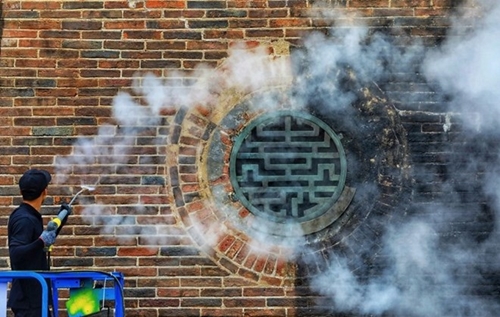The project is part of a global cultural sponsorship program that Karcher Group has launched since 1980.
To clean the monument, the experts use a gentle steam setting at a surface pressure of 0.5 to 1 bar and a temperature of up to 100 degrees Celsius. Four hot water, high-pressure cleaners generate the steam that removes algae, mosses, fungi, lichens, and bacteria. This way, absolutely no chemicals are needed. This type of cleaning also delays the growth of new bio-genetic vegetation, as the steam's high temperature destroys the deeper-seated spores.
    |
 |
|
Many of the nearly 200-year-old gate's bricks (L) have regained their bright red color after 15 days. Photo: vnexpress.net |
After being cleaned, dirt and biological contaminants that had accumulated over the years were removed, showing the original color and beauty of the work.
The modern technology is friendly to the environment and harmless to the materials of the works, thus helping maintain the monument.
Vo Le Nhat, Director of the Hue Monument Conservation Center, said that Ngo Mon (Noon Gate) was built in 1833 under the Nguyen Dynasty, which is considered a masterpiece of the Hue citadel architecture.
However, the tropical climate, with plenty of rain and high humidity, has led to the original color of the brickwork and the grey limestone being covered in dark organic vegetation.
The project has helped maintain the original architectural values of one of the typical imperial architecture of the Nguyen Dynasty, contributing to improving service quality for visitors to Hue Monument Complex – a UNESCO-recognized World Heritage Site, he said.
Source: VNA